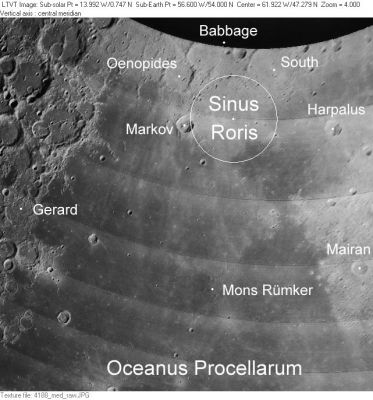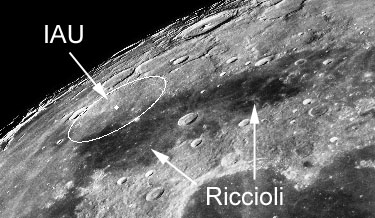Sinus Roris
Contents
Sinus Roris
|
Lat: 54.0°N, Long: 56.6°W, Diam: 202 km, Depth: km, Rükl: 1 |
LO-IV-188M The white circle illustrates the current IAU definition of Sinus Roris. Originally the name seems to have meant most of Oceanus Procellarum north of Mons Rümker, but ending at Harpalus, for the dark mare region beyond that (upper right) is now regarded as part of Mare Frigoris.
Images
LPOD Photo Gallery Lunar Orbiter Images
- Although there's nothing Sinus Roris-like mentioned in the LPI's Apollo Images Search, there are few orbital Hasselblads of Sinus Roris' southern part in Apollo 15's Hasselblad magazine 93-P (photographs AS15-93-12730 to 12734, looking north). Research: Danny Caes
- Curious twisted arc-shapes in Sinus Roris. Take a look at the lower part of Lunar Orbiter 4's frame LOIV-170-H3. This kind of twisted arc-shapes is also noticeable at Mare Frigoris, between La Condamine and J.Herschel. - DannyCaes Nov 10, 2009
Maps
(LAC zone 10C2) USGS Digital Atlas PDF
Description
Description: Neison, 1876
(IAU Directions) SINUS RORIS - The great northern bay of the Oceanus Procellarum, bordered on the east by the highlands of the Sinus Iridum, on the north by the elevated region between Harpalus and Oenopides, and on the west by the bright ridge extending between Oenopides and Gerard. The northern section of the floor is the brightest and is traversed by a number of grey ridges.
Description: Wikipedia
Additional Information
Nomenclature
- Sinus Roris is Latin for "Bay of Dew".
- According to Whitaker (p. 216), this name was introduced on Riccioli's map. However, Riccioli used the name to refer to the dark mare patches on either side of the crater Harpalus as seen in this zero-libration Earth-based view adapted from the Consolidated Lunar Atlas (note: for orientation, the word "Riccioli" is printed over Sinus Iridum and the prominent central-peaked crater at the top is Pythagoras with Babbage below it):
- Later cartographers extended Riccioli's definition of Mare Frigoris to include the dark mare region on the east of Harpalus. This pushed Sinus Roris to the west and south, where it assumed an increasingly ill-defined status.
- The name as adopted into the original IAU nomenclature of Blagg and Müller (1935), presumably refers to the large area described by Neison (above), which incorporates most of Oceanus Procellarum north of Mons Rümker.
- The name as printed on the System of Lunar Craters Quad Maps seems to continue this tradition, with the name printed in Oceanus Procellarum roughly midway between Markov and Mairan.
- For unknown reasons the IAU Planetary Gazetteer adopted a position and diameter (quoted in the title line of this page) that correspond to a much more restricted area, which is now, by default, the official definition. On the highland side it is bounded roughly by the craters Markov, Oenopides, Babbage and South; and on the mare side it extends only to about the location of Harpalus E. Most of the area within this official circle is rough bright material, rather than dark mare.
LPOD Articles
Bibliography

